
What Type of Knife Steel is The Best For You?
When it comes to selecting the ideal knife, the type of steel used in its construction is a critical factor to consider. From culinary experts to outdoor enthusiasts, the choice of knife steel can significantly impact the performance and longevity of the tool. This guide aims to demystify the world of knife steels, helping you understand their intricacies and make an informed decision about which type of steel is the best fit for your needs.
Factors to Consider
Before selecting knife steel, there are several key factors you should consider:
- Hardness: This determines how well the knife can maintain its sharpness. Harder steels usually stay sharp for a longer time but can be more difficult to sharpen.
- Toughness: This is a measure of how well the knife can withstand impact and resist chipping or breaking. Tougher steels are less likely to crack, but they might not be as sharp as harder steels.
- Corrosion Resistance: If you are planning to use the knife in wet environments, you should consider a steel type that is resistant to rust.
- Edge Retention: This refers to how long the knife will remain sharp with use. Some steel types may require more frequent sharpening.
- Ease of Sharpening: While some steel types maintain their edge for a longer time, they can be more challenging to sharpen. Consider your comfort and skill level with sharpening when making your choice.
By considering these factors, you can hone in on the type of steel that best suits your particular requirements and preferences.
Common Types of Knife Steel
There are numerous types of knife steel, each with distinct characteristics. Here are some commonly used types:
- Stainless Steel: Known for its corrosion resistance, stainless steel is perfect for kitchen use or in humid environments. However, it may require more frequent sharpening.
- Carbon Steel: Valued for its exceptional hardness, carbon steel retains sharpness very well. It’s ideal for precision tasks but is prone to rust if not properly cared for.
- Tool Steel: Extremely tough and resistant to wear, tool steel is often used in heavy-duty applications. It’s less corrosion-resistant and harder to sharpen.
- Alloy Steel: This is characterized by its versatility. Alloy steel can be manipulated to balance hardness, toughness, and corrosion resistance based on the additional ingredients used in its manufacture.
- Damascus Steel: Renowned for its beautiful patterns and exceptional toughness, Damascus steel is a favorite among knife collectors and enthusiasts. However, it can be quite expensive.
Remember, the best knife steel depends on your individual needs and applications. Understanding these types can help you make an informed decision when selecting your next knife.
Popular Knife Steel Alloys
Here are some of the popular knife steel alloys, each offering unique benefits:
- 154CM Steel: This is a high-end stainless steel that is known for its excellent edge retention and durability. It has a high carbon content which makes it harder than regular stainless steel.
- VG-10 Steel: A Japanese import, VG-10 steel is renowned for its balance between hardness, toughness, and corrosion resistance. It is commonly used in high-quality chef knives.
- D2 Steel: This is a tool steel that is known for its hardness and good edge retention, but it’s not as corrosion-resistant as some other steel.
- S30V Steel: A high-vanadium stainless steel, S30V is known for its excellent edge retention and resistance to corrosion. It’s often used in premium pocket knives and other cutting tools.
- M390 Steel: Regarded as super steel, M390 has a high chromium content that makes it extremely resistant to corrosion. It’s also hard and maintains sharpness well.
- AUS-8 Steel: This is a Japanese stainless steel that offers a good balance of toughness, edge sharpness, and corrosion resistance. It’s an affordable option commonly used in a variety of knives.
Remember, different alloys have unique strengths and weaknesses. Your choice should be guided by your specific requirements and the intended use of the knife.
Choosing the Right Steel for Your Needs
Choosing the right knife steel for your specific needs and purposes is crucial to getting the most out of your tool. If you frequently engage in outdoor activities like camping or hunting, tough steel like Tool Steel or D2 Steel might be the best choice for you. For kitchen use, corrosion-resistant steel such as Stainless Steel or VG-10 Steel could be ideal. If you’re a knife enthusiast or collector who values aesthetics as well as functionality, you might opt for the uniquely patterned Damascus Steel.
For those on a budget, AUS-8 Steel offers a good balance of attributes without breaking the bank. If, on the other hand, cost is less of a concern and you’re seeking top-of-the-range performance, consider investing in the super steel, M390.
Remember, there is no ‘one-size-fits-all’ solution when it comes to knife steels. The best choice will depend on a combination of your specific use-case, personal preferences, and budget constraints. Always take the time to research and compare different options before making your final decision.
Conclusion
Selecting the right knife steel requires a thorough understanding of its properties and characteristics. By considering factors such as hardness, toughness, corrosion resistance, edge retention, and ease of sharpening you can narrow down your search to the type that best meets your needs. Popular steels include Stainless Steel, Carbon Steel, Tool Steel, Alloy Steel, Damascus Steel, 154CM Steel, VG-10 Steel, D2 Steel, S30V Steel, M390 Steel and AUS-8 Steel. Each offers different benefits for different uses and budgets. By taking the time to research your options carefully and choosing a steel that meets your specific needs you can ensure you have the right knife for any job or task.



